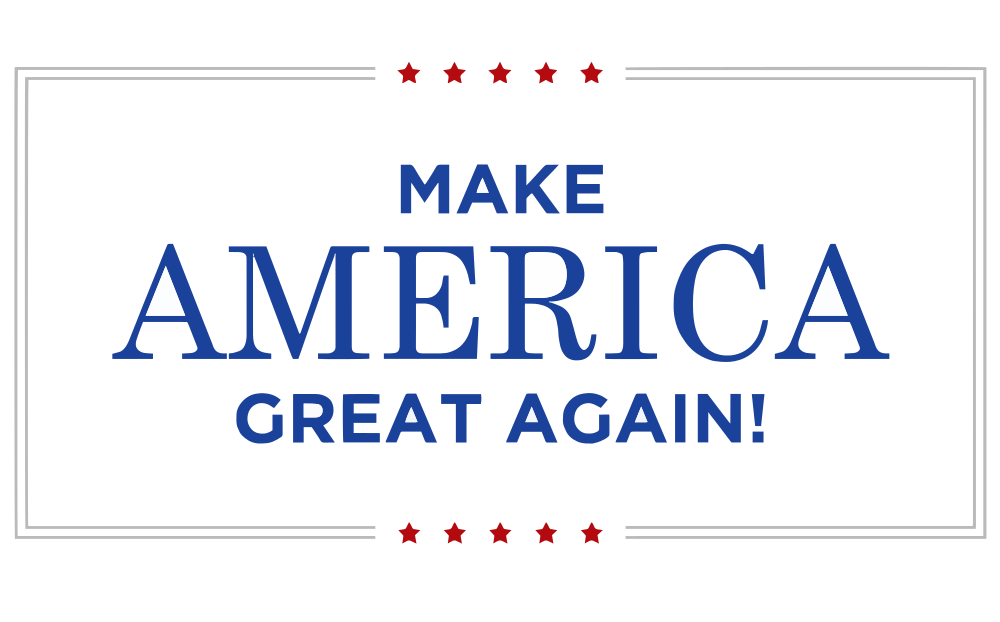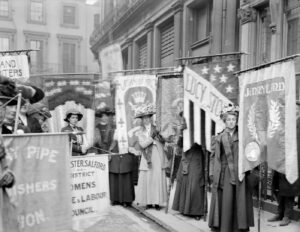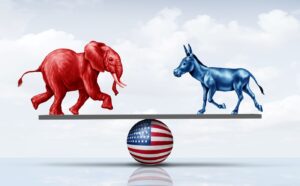In his famous 1946 essay, “Politics and the English Language,” George Orwell noted “the special connection between politics and the debasement of language.” “When one watches some tired hack on the platform,” wrote Orwell,
mechanically repeating the familiar phrases—bestial atrocities, iron heel, bloodstained tyranny, free peoples of the world, stand shoulder to shoulder—one often has a curious feeling that one is not watching a live human being but some kind of dummy: a feeling which suddenly becomes stronger at moments when the light catches the speaker’s spectacles and turns them into blank discs which seem to have no eyes behind them. And this is not altogether fanciful. A speaker who uses that kind of phraseology has gone some distance toward turning himself into a machine. The appropriate noises are coming out of his larynx, but his brain is not involved, as it would be if he were choosing his words for himself. . . . And this reduced state of consciousness, if not indispensable, is at any rate favourable to political conformity.
“Bestial atrocities,” “iron heel,” and “bloodstained tyranny” were the hack phrases of Orwell’s day, not ours. We look back on them with the amusement hindsight offers. We are less likely to be aware of our own sins against the English language, precisely because we are so close to the words and phrases that have become an automatic part of our vocabulary that we no longer realize how meaningless they are.
What if, in writing or speaking about important public matters, we have a similar problem using words or phrases that are meaningless?
Taking Back America from “The Establishment”
Start your day with Public Discourse
Sign up and get our daily essays sent straight to your inbox.One obvious example would be the slogan, “We need to take back America!” Take it back? From whom? Did Russia invade? No? Then from whom are we taking it back?
If recent elections are any gauge of such matters, on many political issues Americans are 49 percent on one side and 50 percent on the other (with a 3 percent margin of error). So from whom would we be “taking back” the country? Basically from the other 50 percent of Americans. Both halves of the voting public are aggressively trying to “take back the country” from the other half, with the notion of “compromise” anathema to both.
The results are fairly predictable: 100 percent of the country is frustrated with the “gridlock in government” that is the natural result of their empty slogans and their failure to realize that the country hasn’t been invaded by Russia but is simply engaged in democratic debate between two opposing sides.
Some people wish to insist that we’re trying to “take back the country” from “the establishment.” Who exactly is “the establishment”? Anyone who works in Washington, DC? I know a guy who works as a school teacher in DC. Is he part of the establishment? How about anyone who works for the government in DC? I know a woman who works as a secretary for the FAA. Is she part of “the establishment”?
No, the problem isn’t just in Washington; it’s all those organizations that use their money to influence government! You mean like the Sierra Club, the National Rifle Association, the Heritage Foundation, the Brookings Institution, Google, GM, Ford, the Koch brothers, George Soros . . . need I go on? Money used to influence the government the way I want is money to “take back the country.” Money my opponents use to further their agenda becomes part of the hated “establishment.”
One of the tragedies of being the Devil is that you can’t ever really taste innocence because you corrupt everything you touch. If, instead of turning everything to gold, like Midas, your touch turned everything to trash, then you could never taste beauty. Washington, DC, has, it seems, become the ultimate Devil’s touch. We send people there to “get the country back.” But once they step into office, they become part of the hated “establishment.” In this way, Ted Cruz, one of the most disruptive members of the Senate, has become part of the hated “establishment,” and Donald Trump, a man waist-deep in crony capitalist favoritism, is somehow anti-establishment. On the other side, both Clinton and Sanders run as “anti-establishment” candidates. Such claims are as meaningless as the word.
Making the System “More Fair”—But What’s Your Definition of “Fairness”?
Let’s take a nicer-sounding word, like “fairness.” Think of such promises as, “I’m going to make the system more fair.” This sounds very nice. But what does it mean? One of the biggest challenges facing current American political discourse is that there are two common meanings of “fair” that are mutually exclusive.
One meaning of “fair” in effect says, “You didn’t build that.” Expressed in its most sophisticated form in John Rawls’s A Theory of Justice, it involves an equal distribution of all of society’s goods. Rawls identifies two basic principles of “justice as fairness.” First, there should be “equality in the assignment of basic rights and duties.” Second, social and economic inequalities should be permitted only if they result in “compensating benefits for everyone, and in particular for the least advantaged members of society.” Rawls’s theory of “fairness” is so radical that he believes even the “natural assets” with which individuals are born—not only the status, wealth, or privileges of their family, but “even the willingness to make an effort, to try, and so to be deserving in the ordinary sense [that] is itself dependent upon happy family and social circumstances”—must be compensated for. Thus, “fairness” would entail high taxes on the rich and better schools for the poor than for the children of the wealthy.
The second common view of “fairness” in our society is based on merit. It says, in effect, “I worked hard for this, so I get to keep it.” Robert Nozick’s Anarchy, State, and Utopia expresses a well-known defense of this view, but we can also trace its lineage back to John Locke’s “labor theory of property.” In Locke’s formulation, it is due to the fact that I have mixed my labor with the earth’s resources that it becomes my “private property.” Of course, the human tendency to feel that “those who shall not work should not eat” clearly goes back further than Locke. It is a very deep-seated tendency, and whether one could ever really eradicate it from the human spirit is deeply questionable.
What is “fair” for one group of Americans—“I get to keep what I earn”—is not only different from what the other group means, it can often be totally contrary to it: “No, because you didn’t build that.” If I get to keep what I earn, then we are not spreading out the benefits of society equally; this would be deemed “unfair” by those who accept any version of egalitarian fairness. And if we were to take what people have earned through their hard work and spread it out equally among the entire population, some of whom may not have worked hard, then this would be deemed “unfair” by those who accept a merit-based view of fairness.
Often enough, this confusing bifurcation about what is “fair” is not only between two opposing camps, but within one and the same person. In some moods, we favor the egalitarian tendencies of fairness, while in other moods, we insist on the merit-based approach. We want “the poor” to be “taken care of” and to “get a fair shake.” But when someone proposes to raise our taxes to bring about a more equal distribution, we’re suddenly less excited about the prospect. This is why we respond positively to appeals to “tax the rich,” as long as the meaning of the term “rich” remains vague enough that it doesn’t include us.
Making the system “fairer,” therefore, has become another one of those slogans that can mean anything to anyone. To one person, a “fair economy” means “tax the rich” and “spread the wealth”; to another, it means “I get to keep what I earn.” After the election, someone is going to feel betrayed. And if I’m one of those unfortunate people who wants to “tax the rich,” “spread the wealth,” and “keep what I earn,” then I will undoubtedly love the slogans, but I cannot help but feel betrayed, no matter what my elected officials do. If there are still poor people around who have less than the richest people, and my taxes have gone up, then I’m going to feel completely betrayed.
Making America Great
Consider one last such slogan: “Make America Great.” Here is a statement tailor-made for Socrates. One can just imagine the Platonic dialogue based on the question:
“And what, O Callicles, do you mean by ‘great’? Is greatness determined by power? By wealth? Or by virtue?”
“Clearly, Socrates, greatness is generally recognized to be asserted based on power and wealth. If ‘greatness’ were ascribed based on virtue, then we would never call tyrants such as Peisistratus and Hippias and others like them ‘great men,’ but we do.”
“Yes, dear Callicles, the common people do sometimes speak that way, but not generally when they have to live under such tyrants or are suffering from their cruel whims. So let us examine more closely to see whether what we sometimes call ‘great’ is in fact so, or whether, like what we call ‘the good,’ it is sometimes truly good and sometimes merely the illusory good.”
Or, for a more contemporary take, we might send out the following survey:
What makes America great? Choose one:
1. We’re the wealthiest country in the world.
2. We have the strongest army in the world.
3. We’re morally good.
4. We take care of the poor and disadvantaged in our society.
5. We treat other nations with justice.
6. We are faithful to the constitutional order established by the Founders and the political principles set forth in The Federalist Papers.
Would options 1 and 2 totally outstrip answers 3 through 6? How would the politicians using this slogan answer the question? Deciding on the proper ordering of goods is an essential task of any leader expected to strive for the common good of the body politic. If our politicians will give us no sensible answer to the question above, perhaps it is because they have become adept at harnessing its vagueness. After all, if a slogan can mean anything to anyone, who could oppose it?
“Progress.” “Growth.” “Fairness.” “Protecting America’s Interest.” “Looking Out for the Middle Class.” “Putting America First.” “The War Against Women.” All are meaningless slogans that are allowed to substitute for real discussion of the serious issues facing the nation. They tell us nothing more about the candidates than phrases like “You’re Worth It,” “Be More,” and “Be There!” tell us about L’Oréal’s shampoo, PBS’s educational value, or NBC’s programming. In fact, come to think of it, maybe I got them mixed up; maybe “You’re Worth It” was PBS and “Be More” was L’Oréal—not that it matters much either way.
But it certainly does matter what “protecting America’s interests” means if we’re judging a potential president. Just as we’ll need to know a lot more about what “greatness” and “fairness” mean for the people using those words before we cast a vote this serious.
By the same token, you’ll know you’re dealing with pundits who have nothing serious to say and are merely “selling shampoo” if you start hearing terms like “competency gap,” “presidential gender equity,” or “most experienced politician of our time” taking center stage. God help us.










